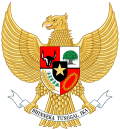| Portfolio | Minister | Took office | Left office | Party |
|---|
| Minister of Home Affairs | | 19 August 1945 (1945-08-19) | 14 November 1945 (1945-11-14) | | Independent |
| Minister of Foreign Affairs | | 19 August 1945 (1945-08-19) | 14 November 1945 (1945-11-14) | | Independent |
| Minister of People's Security | | 6 October 1945 (1945-10-06) | 20 October 1945 (1945-10-20) | | Independent |
Muhammad Soeljoadikusuma | 20 October 1945 (1945-10-20) | 14 November 1945 (1945-11-14) | | Independent |
| Minister of Justice | | 19 August 1945 (1945-08-19) | 14 November 1945 (1945-11-14) | | Independent |
| Minister of Finance | | 19 August 1945 (1945-08-19) | 22 September 1945 (1945-09-22) | | Independent |
| 22 September 1945 (1945-09-22) | 14 November 1945 (1945-11-14) | | Independent |
| Minister of Education | | 19 August 1945 (1945-08-19) | 14 November 1945 (1945-11-14) | | Independent |
| Minister of Health | Dr. Boentaran Martoatmodjo | 19 August 1945 (1945-08-19) | 14 November 1945 (1945-11-14) | | Independent |
| Minister of Social Affairs | | 19 August 1945 (1945-08-19) | 14 November 1945 (1945-11-14) | | Independent |
| Minister of Information | | 19 August 1945 (1945-08-19) | 14 November 1945 (1945-11-14) | | Independent |
| Minister of Transportation | | 19 August 1945 (1945-08-19) | 14 November 1945 (1945-11-14) | | Independent |
| Minister of Welfare | | 19 August 1945 (1945-08-19) | 14 November 1945 (1945-11-14) | | Independent |
| Minister of Public Works | Abikusno Tjokrosujuso | 19 August 1945 (1945-08-19) | 14 November 1945 (1945-11-14) | | Independent |
| Deputy Minister of Home Affairs | Harmani | 19 August 1945 (1945-08-19) | 14 November 1945 (1945-11-14) | | Independent |
| Deputy Minister of Information | | 19 August 1945 (1945-08-19) | 14 November 1945 (1945-11-14) | | Independent |
| State Minister | Mohammad Amir | 19 August 1945 (1945-08-19) | 14 November 1945 (1945-11-14) | | Independent |
| State Minister | | 19 August 1945 (1945-08-19) | 14 November 1945 (1945-11-14) | | Independent |
| State Minister | | 19 August 1945 (1945-08-19) | 14 November 1945 (1945-11-14) | | Independent |
| State Minister | | 19 August 1945 (1945-08-19) | 14 November 1945 (1945-11-14) | | Independent |
| State Minister | Mohammad Amir | 19 August 1945 (1945-08-19) | 14 November 1945 (1945-11-14) | | Independent |
| State Minister | | 19 August 1945 (1945-08-19) | 14 November 1945 (1945-11-14) | | Independent |




